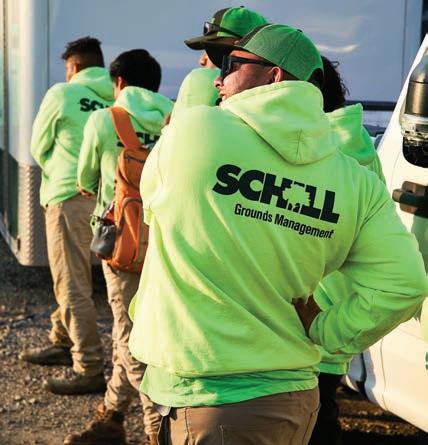
5 minute read
GROUNDBREAKER Growing With Your Business
from Summer 2025 Issue - Outdoor Living
by SYNKD—Landscape design, build and maintain all on the same page
Jerry Schill is the president and CEO of Schill Grounds Management, based in North Ridgeville, OH. After graduating from Glenville State College in 1992, he founded the company the following year with his brother. What began as a small, local operation has grown into one of the nation’s largest commercial landscaping companies, with more than 1,600 employees across 31 locations. With 16 acquisitions completed since 2020, Schill’s focus on people, process, and purpose continues to guide the company’s evolution. SYNKD sat down with him to explore the journey.
Our industry is a challenging one. It’s not a quick fix or a quick win. Could you give us a glimpse of those 32 years and how you’ve found success?
Like I tell my kids, we’re a 32-year overnight success. But before I jump into the timeline, you made an interesting comment: It’s a difficult industry, but I think all businesses are challenging. They all have their own nuances and complexities. But I think it’s about resiliency and persistence.
Entrepreneurs are just wired differently. It’s not the widget or service they’re providing, which comes with its own set of challenges. The true entrepreneurial spirit is building a better mousetrap. That’s what makes it fun.

On the technology side, did you create your own solution?
Like many others, we started with pen and paper, then moved to carbon copies, Excel, and Access. We used Boss for a few years before switching to Aspire, where we became one of the platform’s early adopters. I was fortunate to know Kevin Kehoe, one of Aspire’s founders, and worked closely with Mark Tipton during those early days. While we didn’t create the technology, we provided feedback that helped shape it—and we’ve never looked back.
We quickly realized how critical real-time transparency and data were for managing multiple locations. That mindset carried over into every area of the business—we’ve embraced technology wherever it helps us improve efficiency and service.

It sounds like when you split the company in 2012, you had a clear vision that helped you hire the right people to make the company sustainable.
We did. My brother and I have always been consultant junkies. We’re college-educated, but we really learned from associations and peer businesses. Jim Paluch and Aaron’s Gravely were instrumental. They put together the Working Smarter Training Challenge. We learned about lean practices, eliminating waste, standardization—Kaizen, Gemba—all of it. That was transformative. We realized we had overcomplicated our business and needed to simplify it.
We needed to take the guesswork out of everything—one truck, one trailer, one set of equipment. Train foremen one way, account managers another. Create a scalable, replicable, portable model. We wanted to create real opportunities for people.
Here in Cleveland, for example, there’s a guy named Jake. He started as a technician. Now, at 34, he runs one of our largest operating companies. That takes time, energy, grit, and intentional effort. But we love doing it, and we’re committed to continuing that work.
That’s such good advice. What would you say is the biggest challenge in your business today, aside from succession planning? Culture. We operate in 31 different locations. Even though we have different brands, we focus on consistent core values. The business is doing really well, but it’s tricky to maintain consistent culture, vision, and direction across all locations.
Once you build the right culture, it’s about finding people who align with it. Yet labor shortages are a hot topic in the industry. What’s your take?
Labor has been a challenge for 32 years. It’s not new. Working in the trades is gratifying but tough—hot, cold, and physically demanding. Our mindset is: don’t complain, do something about it. Companies will spend $200,000 on a truck but balk at $70,000 for a recruiter. We built our largest department around HR. That includes compliance, payroll, benefits, and multiple talent acquisition staff. We have a staffing matrix, we assess who’s doing well, who’s promotable, and where the gaps are. Our employees are still our biggest referral source, but our recruiters constantly seek quality talent that aligns with our values.
That level of intention is impressive. And it’s true—hiring the wrong person is costly, even if it’s not as obvious as buying the wrong equipment.
Exactly. One thing we’ve learned is that the difference between us and other companies often comes down to mindset. We see hiring and training as investments, not expenses. A new business developer might sell $750,000 in their first year and $2 million by year three. That’s a huge ROI.
We see hiring and training as investments , not expenses.
What advice would you give to newer owner-operators who are just a few years into the industry?
First, don’t try to figure it all out on your own. Lean on associations, peer groups, and others in the industry. One of the best things about our field is how willing people are to help. Just ask. Second, build your business like you’re going to sell it. That doesn’t mean you have to sell it—it might go to your kids or employees—but if you build it to sell, you’ll make better decisions. You’ll build a profitable, sustainable business that others want to be part of. n
Watch the full interview at https://youtu.be/oDQwmdEoeJg.
All photos courtesy of Schill Grounds Management
FOR MORE INFO
Jerry Schill Owner of Schill Grounds Management
North Ridgeville, OH
jschill@schilllandscaping.com www.schilllandscaping.com











